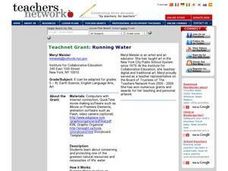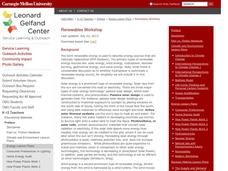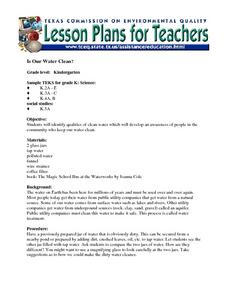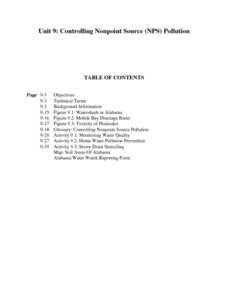Curated OER
Primary Energy Sources Pros and Cons
Students explore the different types of renewable and nonrenewable energy sources. In this earth science lesson, students discuss the pros and cons of each type. They conduct a variety of experiments on renewable energy.
Curated OER
A Hiking We Will Go
Students identify and describe examples of point source pollution. In this hiking lesson plan, students classify water pollution as either point source pollution or nonpoint source pollution. They listen to a story, take a walk around...
Curated OER
Running Water
Sixth graders create products that feature the importance of water conservation. In this environmental stewardship lesson, 6th graders explore the water cycle and conduct on water usage. Students also research water pollution and...
Curated OER
Biology and the Future
Can science help minimize the damaging effects of an oil spill? Get your scholars brainstorming how different types of scientists are involved in developing ways to clean up oil spills. A table is partly filled in, and students complete...
Curated OER
WATER QUALITY FOR FRESHWATER ORGANISMS
Students use determination of dissolved oxygen and water temperature changes to determine the environmental impact from thermal pollution.
Curated OER
Dirty Water
Pupils, through a case study of actual water sources in Washington State, identify major sources of aquatic pollution. They also categorize pollutants, make inferences about the effects of pollutants on the environment and construct bar...
Curated OER
Water Pollution
Fifth graders examine what contaminated water looks like, and how it becomes polluted. They examine a teacher demonstration of water is not polluted but does contain rocks and other things that do need to be cleaned out before drinking...
Curated OER
Water filtration with Plants
Sixth graders explain how soil and plants effect contaminated water in nature. In this filtration instructional activity, 6th graders work in groups to test biofiltration units. Students determine which biofiltration units work...
Curated OER
Ocean Planet: Pollution Solution
Young scholars explore the concept of environmental stewardship. In this science lesson, students investigate the impact of oil spills as they discuss historical spills. Young scholars use problem solving skills to brainstorm clean-up...
Curated OER
Groundwater Modeling
High schoolers evaluate the effects of point and non-pointy sources of water pollution using a model. They assess human impact on water quality. Students build a model which represents an aspect of the hydrosphere and compare their model...
Curated OER
Human Impact on Water Quality
Students identify at least three common repercussions of developing water front property on water quality. They describe three sources of water pollution. They research the organism striped bass and observe it if striped bass is available.
Curated OER
Chemical Consequences of Burning Fossil Fuels
Future scientists are introduced to the chemical consequences of burning fossil fuels, learning that fossil fuel combustion leads to the formation of oxides of three nonmetals: carbon, nitrogen, and sulfur, all of which end up in the...
Carnegie Mellon University
Renewables Workshop
Youngsters examine resource maps to find out which states are using solar and wind power and discuss as a class various other renewable energy sources. They use a provided data table to record pros and cons to each technology, build and...
University of Wisconsin
Follow the Drop
Young surveyors look for patterns in water flow around campus. Using a map of the school (that you will need to create), they mark the direction of the path of water. They also perform calculations for the volume that becomes runoff. The...
Curated OER
Is Our Water Clean?
Students identify qualities of clean water and develop an awareness of people in the community who keep our water clean.
Curated OER
Contaminated Drinking Water
Students discover whether their senses can detect unsafe drinking water. In the water activity lesson, students follow procedures to determine whether their bodies can detect contaminated water.
Texas Commission on Environmental Quality
Environmental Sciences
Whether you are teaching environmental science in junior high or studying recycling in kindergarten, there is something for all in this set of lessons designed for environmental education. The 110-page packet comes with tips for...
Teach Engineering
Aerogels in Action
Model an oil spill cleanup. An engaging engineering lesson has groups using aerogels to simulate an oil spill cleanup (vegetable oil in water). Along the way, they learn about nanotechnology and hydrophilia/hydrophobia.
Curated OER
Salt Marsh in a Pan
Students create a model of a salt marsh to discover the impact of pollution and human activities on water-based habitats including bays and the ocean. They recognize the relationship between natural and developed areas. Students impact...
Curated OER
Pollution Solution
Students, after discussing oil pollution, generate solutions to an oil spill.
Curated OER
Water Issues on Puerto Rico and Oahu: A Comparison of Two Islands
Fifth graders explore how the tow islands receive and use fresh water. They also address some of the threats to the fresh water supply on each island. Students explore the instructional activity objectives through water cycle models...
Curated OER
Clean Kansas Water
Students gain an understanding of ways we can be responsible custodians of our water supply. Students explore the governor's clean water initiative involving the Lower Kansas/Republican river basin and the pollutants present there.
Curated OER
Controlling Nonpoint Source Pollution
Students examine factors affecting water quality. They test water in a local body of water to determine its quality. They collect data and continue monitoring the water monthly. They assess water quality in the home and on the farm.
Curated OER
What Happened to the Water? Designing Ways to Get and Clean Water
Young scholars design ways to clean a water source or find a new water source depending on various hypothetical family scenarios. They draw and write about how to provide water to a community facing a water crisis, and present their...

























